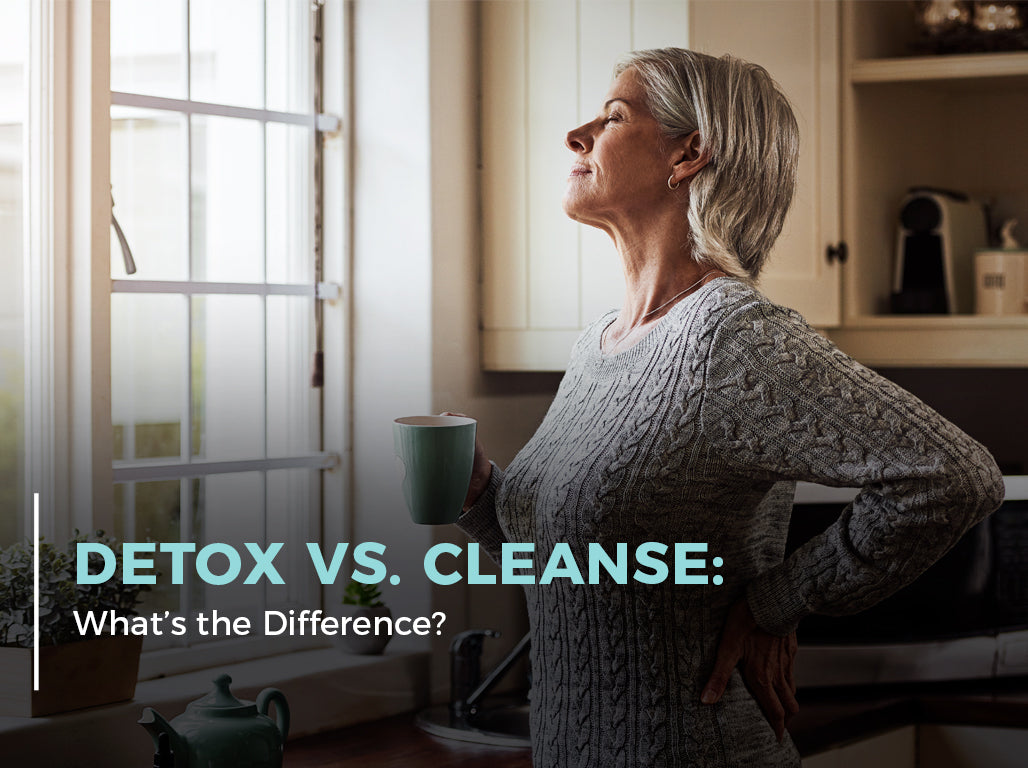Just about everywhere you turn, there are toxins. They are in your environment, food, home, personal products, water, and the list goes on and on.
These toxins can cause health issues like chronic fatigue, dizziness, headaches, insomnia, sensitivities, and many others.
Fortunately, your detox organs work endlessly, eliminating toxins from your body. But because you’re inundated with toxins daily, sometimes your colon, kidneys, liver, lymphatics, and skin could use some extra support.
Cleanses and detoxes are two ways to help your body rid itself of toxins. Some people tend to use the two interchangeably, which makes it quite confusing as to what the differences are and how to choose between them.
Products that promise to cleanse and detox are a fast-growing $50 billion market. That number could reach $70 billion by 2025. People are looking for ways to cleanse their bodies and regain health. It isn’t as easy as drinking a few green juices, however, and it can be quite confusing to navigate that market. Knowing the difference between a detox and a cleanse is an important first step. (1)
Let’s try to clear up some of the confusion and take a look at the differences and similarities between a detox and a cleanse.
What Is a Cleanse?
The primary goal in a cleanse is to give your body a rest from having to digest and process chemical-laden, heavily processed foods. A cleanse can be anywhere from a few days to a few months, and can lead to less bloating, better bowel function, and increased energy. (2)
Whereas detox focuses on ridding your body of toxins and happens over a longer period, a cleanse mostly deals with the gut and is a much shorter protocol. There are several ways to cleanse, but a person typically focuses on eating clean, healthy, whole foods and drinking fresh, filtered water.
There are many reasons you may decide to do a cleanse. Here are some types and reasons for different cleanses.
3 Types of Cleanses
Colon Cleanses
Cleansing your colon can lead to less bloating, constipation, and diarrhea, and can even rid your body of toxins and parasites. By focusing on high-fiber foods, fresh filtered water, and healthy fruits and vegetables, you can support your gut and your bowels, helping them to eliminate harmful toxins from your body. For a more complete cleanse, consider adding digestive-supporting herbs.
Juice Cleanses
One of the most popular types of cleanses today is the juice cleanse. The purpose of a juice cleanse is to reset your digestive system by consuming natural fruit and vegetable juices for a few days or weeks.
Drinking only juice is thought to flood the body with nourishment while flushing away toxins in the gut. Many people buy a juicer and make their juice from organic fruits and vegetables at home. A juice cleanse can flush your system with healthy liquid nutrition while you temporarily eliminate processed solid foods from your diet. (3)
Parasite Cleanses
Although it isn’t the first thing you may think of when considering a healthy cleanse, a parasite cleanse in the gut can be as or more important than any other type of cleanse. Parasites are easy to contract but not so easy to remove.
Parasites can cause a wide range of symptoms, but since these symptoms overlap many other illnesses, they’re easy to overlook. If you experience symptoms such as brain fog, digestion distress, fatigue, and dozens of others, it can greatly benefit your body to do a parasite cleanse.
Parasites love sugar. As far as diet goes, you can choose unprocessed foods and eliminate alcohol, carbohydrates, and sugar from your diet for a minimum of several weeks. This will help reverse an environment where parasites thrive and take over.
But keep in mind that diet alone isn’t always enough to address parasites. Parasites are stubborn critters and will fight tooth and nail to stay in your body. Supporting your body with parasite-killing herbs and essential oils may be a more effective way to kill and eliminate parasites. (4)

Signs You Need a Cleanse
Your body is a natural cleansing machine. However, with the chemical-laden foods, toxins, and many other harmful pathogens in your environment, your body can sometimes use help.
There are several signs your body gives you, letting you know it could use a cleanse. If your body gives you any of the following signs, consider doing a gut or parasite cleanse: (5)
- Bloating
- Body aches
- Brain fog
- Depression
- Digestive distress
- Excessive gas
- Feeling of heaviness
- Foul odors or bad breath
Are Cleanses the Same as Drainage?
The main point of cleanses is to give your digestive system a break and support your detox organs with all-natural foods and herbs. Cleanses support your body’s natural detox processes and help clear out the gut.
In other words, cleanses open up the drainage pathways. So yes, in many ways cleanses are drainage methods. Not every cleanse supports drainage, however, so keep that in mind.
For example, parasite cleanses may help your digestion afterwards because you are ridding your body of critters clogging up organs and pathways. But that’s a bonus. Its main goal is cleaning the body of parasites, not opening up drainage. In fact, for parasite cleanses to work best, you may want to start with other drainage efforts, or a drainage-focused cleanse like a colon cleanse.
Because cleanses often support drainage, they are helpful before detoxing. Why?
Because detox starts with drainage.
Your body has an amazing filtration system. But toxins can get stuck and build up over time. Eventually, your body just can’t keep up.
Naturally, you may think this is the time to start kicking toxins out of your system, because they are the problem. But that can only cause more harm than good.
It’s much like a clog in a drain. Toxins can accumulate in the sink, but if the drain is clogged, there is nowhere to go.
If you push detox before your body is ready and has open drainage pathways, then you may just reabsorb the toxins or add to the buildup.
The answer is to start with drainage.
For this reason, many people begin with a cleanse to prepare their body for a deeper detox. If you have been struggling for a long time with illness, disease, or feel you could be healthier, consider doing a cleanse, then a detox. (6)

What Is a Detox?
Detoxification is a metabolic process that converts the toxins in your body into waste. That waste is then eliminated through your body’s many drainage pathways, including the colon, liver, and lymphatic system.
Chemicals, heavy metals, mold, pesticides, and radioactive elements are all some of the toxins that invade your body daily, giving your drainage pathways a heavy workout.
Because detox is a long-term process that requires certain diet and lifestyle changes, it’s important to do all you can to support your body along the way.
You can think of detox as a shedding of old habits, and not just something that flushes impurities from your gut and your organs. If you’re changing your habits by supporting your body through detox, your whole life can change for the better. (7)
Types of Toxins
A number of toxins exist in the world around us. Of course, we can’t live in a bubble and avoid all of them, but the more informed you are, the better choices you can make for your health. Here are some of the toxins in our environment today: (8)
- Air pollutants (industrial or associated with lifestyle)
- Artificial food dyes, sweeteners, and preservatives
- Asbestos
- Automobile exhaust, which contains carbon dioxide and carbon monoxide
- Biological toxins from pathogens and parasites
- BPA (bisphenol A), which is found in food and drink containers, plastics, the coating of receipts, dental sealants, etc.
- Cleaning chemicals
- Excessive consumption of alcohol, drugs, and prescription and over-the-counter drugs (including many pain medications)
- Fireplace/campfire smoke
- Foods manufactured with plastic equipment, leaking plasticizers
- Fruits sprayed with diphenylamine (to prevent browning of fruit skin)
- Heavy metals (like cadmium, lead, and mercury)
- Herbicides, such as glyphosate
- Mattress, carpet, and furniture off-gassing
- Mold toxins (mycotoxins)
- Paint and solvent fumes
- PCBs (polychlorinated biphenyls) found in plastics, paints, and rubber products
- Personal care products containing lead and toxic chemicals
- Pesticides, including organophosphates and organochlorines
- Polluted or tainted water
- Radioactive elements
- Secondhand smoke
Benefits of Detox
Your body naturally detoxes all the time. However, with the toxins that come at you from just about everywhere, sometimes the body can’t keep up and could use a little help. That’s where detoxing can greatly benefit the organs and systems of your body.
There are many known benefits of detox, such as fewer body aches, improved energy, relief from digestive problems, and relief from headaches.
The main purpose of detoxing isn’t weight loss, as some people think, although that is often an added benefit. Detoxing keeps inner systems healthy and not bogged down by toxins that can derail health, including weight gain. (9, 10, 11)
Signs You Need to Detox
If you experience any of these signs and symptoms, your body could benefit from detoxing: (12, 13, 14)
- Abdominal cramping
- Bloated stomach and extremities
- Body odor
- Brain fog
- Cellulite
- Chronic headaches
- Chronic sinus infections
- Constipation
- Diarrhea
- Difficulty losing weight
- Eczema
- Excessive sweating
- Fewer than two bowel movements per day
- Headaches
- Hemorrhoids
- Indigestion
- Mucus and phlegm production
- Nausea
- Painful and hard swellings (especially in armpits, groin area, and neck)
- Sluggishness
- Stiff or painful joints
- Stomach pain
- Vomiting

Where to Start with Detox
Cleanses work in the gut, but detox looks to pull toxins out of the whole body. It also takes a more intensive approach to removing unwanted substances. Natural herbs can help target specific toxins or even pathogens, like Lyme bacteria. But the most important part of a detox regimen is binders.
For centuries, healers have used various compounds to bind toxins. Today, binders are still popular in alternative, homeopathic medicine. They help bind harmful microbial byproducts, pesticides, radioactive elements, toxic heavy metals, and more. (15, 16, 17, 18, 19, 20)
Ways to Support the Body During Detox
While you’re detoxing, you may want to adjust diet and lifestyle to support your detox organs and body, much like you do during a cleanse. Although the bulk of drainage efforts come prior to detox, you can do maintenance drainage efforts to help minimize reactions. Here are some ways to help the detox process: (21, 22, 23)
- Drink plenty of filtered water to help to flush out toxins.
- Eat anti-inflammatory foods, such as leafy greens and healthy nuts and seeds.
- Incorporate mild to moderate exercise into your daily routine, such as walking or yoga.
- Take herbs that support your kidneys and liver.
- Take phytochemicals that help the liver detox, such as amino acids in protein foods (eggs, meat, nuts, poultry), B vitamins, and magnesium.
Final Words on Detox vs. Cleanse
Although both cleanses and detoxes are healthy and beneficial for the body, it’s difficult to choose the cleanse or detox that is right for you. It’s important to keep in mind that they are a huge money-making industry and that not all cleanses and detoxes are the same, or even beneficial.
By focusing on proper drainage, like through a colon cleanse, you will prepare your body to remove those terrible toxins from your system. By taking binders after you’ve opened your drainage pathways, you can remove the toxins weighing you down and making you sick.
Eating unprocessed whole foods, drinking fresh filtered water, and taking natural herbs will put you on your way to restoring your energy, health, and vitality.
What steps are you going to take today to help your body return to its best state?


